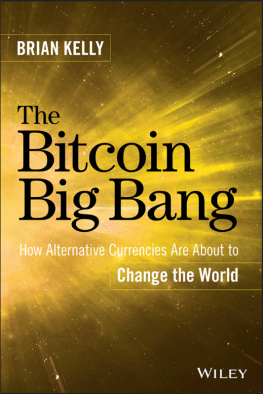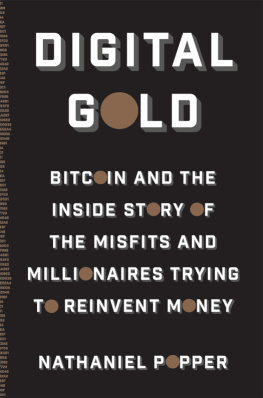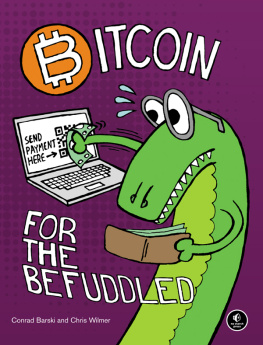HOW MONEY GOT FREE
If Brian Patrick Eha can make me, a Luddite dunce, both understand and care about the enigmatic Bitcoin, and if he can also tantalize the novelist in me with a narrative of intellectual daring and primal risk relating to Bitcoins rise and fall and rise, then he is some kind of journalistic magician. And so he is, because he did all those things and more. Welcome to a new reality and the monetary future. Youll never find a better guide.
Walter Kirn,
author of Up in the Air and Blood Will Out
The nineteenth and early twentieth centuries were ordered by the twin conceptions of mass and energy, and currencies were correspondingly massive forged from precious metals and wood pulp. The late-twentieth and twenty-first centuries have been ordered by information and computation, and money has become digital, cryptographic, and scattered across a light-speed network of circulating trust. In this fascinating book, Brian Patrick Eha describes the inventor-revolutionary-hackers who made Bitcoin a reality how they did it, the computing challenges they overcame, the vested interests they overturned, the laws that they broke, and the socio-technological reality that they are creating. This book is like a fiber-optic cable extending into our uncertain economic future.
David Krakauer,
president and William H. Miller Professor
of Complex Systems, Santa Fe Institute
HOW MONEY
GOT FREE
Bitcoin and the Fight
for the Future of Finance
BRIAN PATRICK EHA

To the crazy ones
CONTENTS
Prologue
MONEY AND LIBERTY
Anything that is in the world when youre born is normal and ordinary and is just a natural part of the way the world works. Anything thats invented between when youre fifteen and thirty-five is new and exciting and revolutionary and you can probably get a career in it. Anything invented after youre thirty-five is against the natural order of things.
Douglas Adams
On the third floor of the Time Warner Center in Manhattan, a glass-fronted mixed-use building that bifurcates as it rises into gleaming towers of luxury apartments, sat the upscale Italian restaurant A Voce. Like the 750-foot-tall building itself, completed in 2004, the restaurant was a symptom and symbol of post-9/11 New York City, the New York that three-term mayor Michael Bloomberg revitalized and sanitized. From the vantage point of someone high up in one of those extraordinary apartments, the green rectangle of Central Park brown now, in late fall spreads out northward in its manicured neatness like a welcome mat for money. It seemed laid out most of all for the new money real-estate money, private equity money, technology startup money that has poured into the city in recent years and set it gleaming, even as its middle-class residents have left in droves.
Like other restaurants of its kind, A Voce was routinely used as a stage for client dinners, power lunches, and other indispensable set pieces of business theater. So it has ever been in New York. But the restaurant will enter history as the place where a small group of men have gathered in private to discuss the newest money of all. More than high-frequency trading, more than the DoddFrank Act, more than any new regulation, the subject at hand here, on this night, stands a better chance than anything else of unsettling the familiar world of finance. Past the hostess stand and coat check girl and through a door off the main dining room, a dozen or so men are drinking wine and snacking on hors doeuvres. It is 10 December 2013 and they are here to discuss Bitcoin, a digital currency and payment system that has grown rapidly from being the plaything of teenage anarchists to the talk of Wall Street.
The magic of Bitcoin is that it enables you to move money almost instantaneously from one side of the planet to the other without needing any bank, corporation, or government. Some of its proponents think it will alleviate poverty in developing nations, plugging everyone into the global economy. Others think it will make banks obsolete. Still others hope it will make governments obsolete.
In March 2013, Bitcoins market capitalization the total value of all bitcoins in existence surpassed $1 billion for the first time. Now, two weeks before Christmas, it is $11.4 billion; units of the digital currency are trading at $948 each. With explosive growth has come intensified media scrutiny as well as greater enthusiasm from investors, hence the need for meetings like this one, to dispel rumors, fight the war of public perception, and spread the gospel. Inevitably, a few members of the press are here, making awkward, predinner small talk over glasses of pinot noir. Most of them are new to the subject, including a Wall Street Journal reporter who wrote his first column on Bitcoin less than a week earlier.
Tonights master of ceremonies is Jeremy Allaire, a big, raw-faced man in a suit and open-collared shirt. He has flown in from Boston, where his new company, Circle Internet Financial, a Bitcoin startup, recently came out of stealth mode announcing that it had raised $9 million of venture capital. Another star of the dinner is Barry Silbert, blond and boyish in his thirties, a brilliant investor and one of the youngest people ever to pass the Stockbrokers Exam. Six weeks ago, he launched a private Bitcoin fund now worth $63 million. Venture capitalist Jim Breyer, who led Facebooks first venture round, can be seen hobnobbing with reporters; so can a lawyer who represents Circle. His cuff links are coins that wink in the light.
Missing from the room, however, are any representatives of the very first wave of Bitcoin adoption, pioneers who risked their money, time, and freedom to build the early infrastructure of a new economy. The lucky ones have gotten rich. More than one, though, will soon find himself on the wrong end of a lawsuit or prison sentence. Two others live as expatriates in Panama. Yet another, a longtime resident of Japan, is preparing to renounce his American citizenship. Before spring, one chief executive will see his company formerly the largest and most profitable Bitcoin exchange in the world fall into ruin around him, and file for bankruptcy protection among accusations of incompetence and fraud. Others were disgraced long before.
Tonight, glass of wine in hand, looking out the window of the private dining room onto Columbus Circle where, high above the yellow taxis circling the roundabout, a thirteen-foot statue of Christopher Columbus stands on his pediment, I cant help but think of them, those absent pioneers, while talk of money, the invisible omnipresent animating force, goes on relentlessly around me.
When I first wrote about Bitcoin, in the summer of 2012, my editor at CNNMoney cautioned me not to treat it as anything more than a curiosity, at best a passing fad. By 10 December 2013, however, the computer network undergirding Bitcoin is more than 250 times faster than the combined processing power of the worlds five hundred most powerful supercomputers. By the end of the year, the digital currencys value in US dollars will be fifty-six times higher than it was in January the largest annual price growth, as far as anyone can tell, of any asset in history.
Why, then, one skeptic asks Allaire, shouldnt we dismiss it as a scam or speculative bubble, as yet another Dutch tulip mania? The dramatic rise in value seems absurd, divorced from any fundamentals. I have a thesis, Allaire tells him, which is that essentially the rising value of Bitcoin is a large put option, or a bet, that Bitcoin gets adopted as a medium of exchange.
Next page
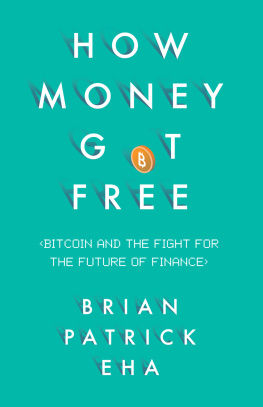
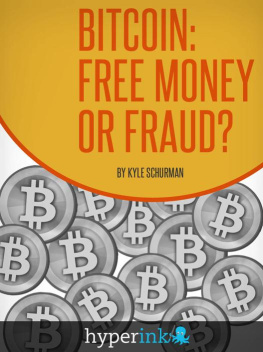
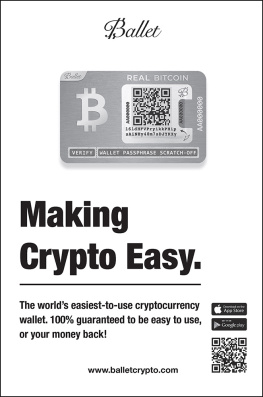

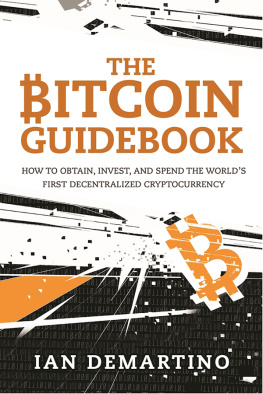
![Brian Kelly [Brian Kelly] - The Bitcoin Big Bang: How Alternative Currencies Are About to Change the World](/uploads/posts/book/119681/thumbs/brian-kelly-brian-kelly-the-bitcoin-big-bang.jpg)
